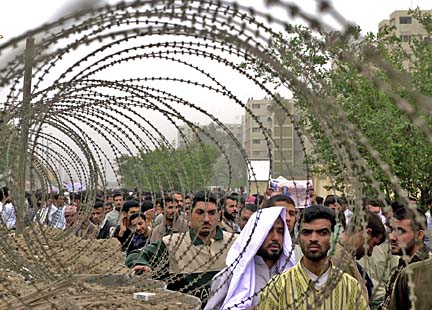

|
Hawaii Marines face
complex test in Fallujah
Pressing the offensive increases
the chances of further alienation
FALLUJAH, Iraq » The men from Fallujah gathered on the red carpet inside their mosque to vent their anger. Instead of feeling liberated, they said the violence of the U.S. offensive to take control of their city has deepened their hatred.
These men came to collect food from U.S. and Iraqi forces at the Hadra Mohamadiya Mosque and were secretly given a swab test for recent explosives handling, something that might mark them as insurgents.
They were clean. But the bitter tone of their remarks sheds light on what drives Iraq's insurgency and how hard it will be to stamp out.
"When you captured Saddam Hussein, I was very happy and not fighting Americans, but you used your guns and your military debased me," said Mahmoud al-Samarrai, whose house was hit by U.S. airstrikes. "I am very angry. I hate all Christians because you killed my family, my city and my mosques."
As U.S. and Iraqi commanders on the ground debate the effectiveness of the battle so far, a key issue is becoming how to address such anger and when to ease the military operations. Senior Iraqi officers argue that it is time to shift from pure military actions to rebuilding. U.S. Marine and Army officers, who launched a blistering tank attack yesterday in southern Fallujah, say they are still under fire, and so the fighting is not yet done.
"We're in this gray area between decisive operations and stability and support," said Lt. Col. Michael Ramos, commander of the Kaneohe-based 1st Battalion, 3rd Marines, which controls northeast Fallujah. "Unfortunately, we're still finding huge weapons caches, and people holed up in houses fighting us."
U.S. officials plan to pay for the rebuilding of much of the city, including cash for damage to houses like Samarrai's. Samarrai's worldview does not include the insurgents, who often used Fallujah's mosques for weapons caches, and its minarets as sniper positions.
The Marines say their experience last April, when they invaded Fallujah to quell an uprising and were ordered to halt before they could take half the city, has taught them the risks of pulling back. Since April, insurgents and Islamic cells loyal to al-Qaida affiliate Abu Musab al-Zarqawi regrouped and turned the city into the primary base of the insurgency.
Completion involves "cleaning out remaining pockets of resistance; all the explosives are truly a safety hazard," said Maj. Gen. Richard Natonski, 1st Marine Division commander.
Just yesterday, he said, "an insurgent was killed putting an (explosive) in a refrigerator. What I'm afraid of is that civilians will come back and find booby traps in their homes. So we're going to get rid of as much of that as we can."
"The Iraqi (top brass) are concerned about public perception. They want an amnesty for these people," said Maj. Mike Zacchea, an adviser and liaison to Iraqi forces at the Hadra mosque. "The Marine Corps way of fighting is to break the will (of the enemy) to fight."
Fallujah is an especially difficult case when it comes to winning hearts and minds. "The Iraqi (forces) repeatedly say the people of Fallujah are different, more religious, zealous, and they are more stubborn and difficult to convince," said Ramos.
Among the most difficult might be those in the Hadra mosque, though they willingly came to accept food aid that began on Monday. Marines evacuated several medical cases to the Jordan hospital, including a 9-month-old baby and an elderly man who had refused to eat for three days.
"All of them are Muslims, and most of them are (extreme) Wahhabis, so they become very nervous in this situation and very angry," said Adnan Naji, a captain in the Iraqi Army and a doctor who set up a makeshift clinic in the mosque that had treated 62 cases by yesterday.
www.mcbh.usmc.mil/3mar/1dbn/1-3%20INDEX.htm
Marine Corps Base Hawaii
www.mcbh.usmc.mil